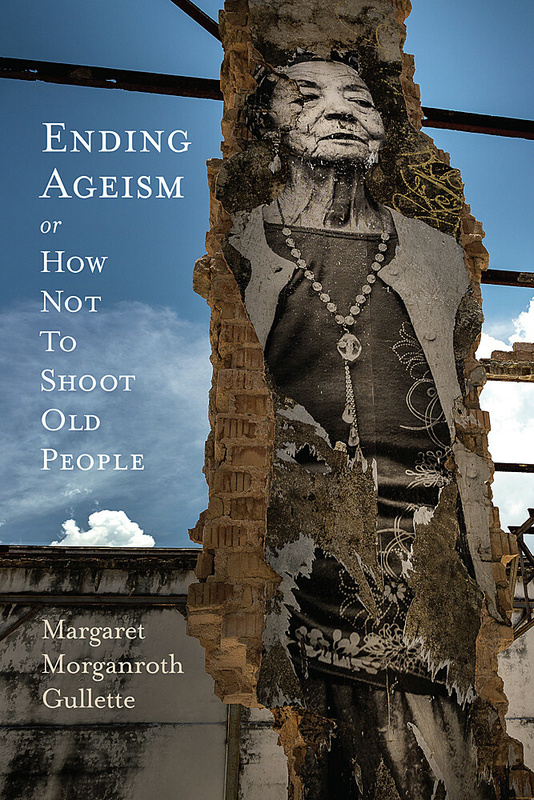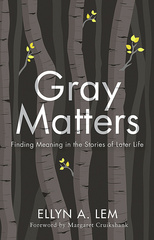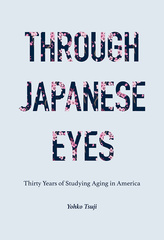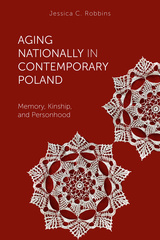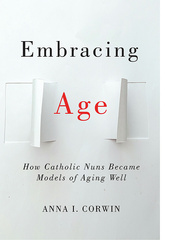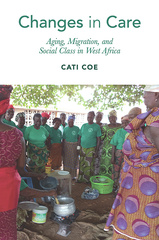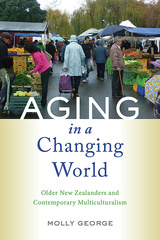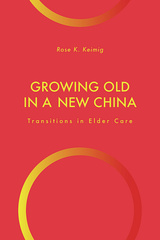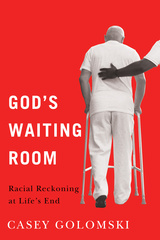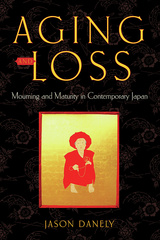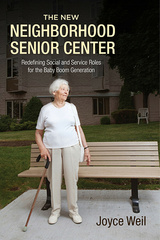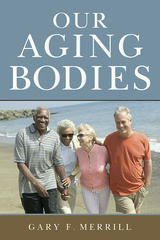Our shopping cart is currently down. To place an order, please contact our distributor, UTP Distribution, directly at utpbooks@utpress.utoronto.ca.
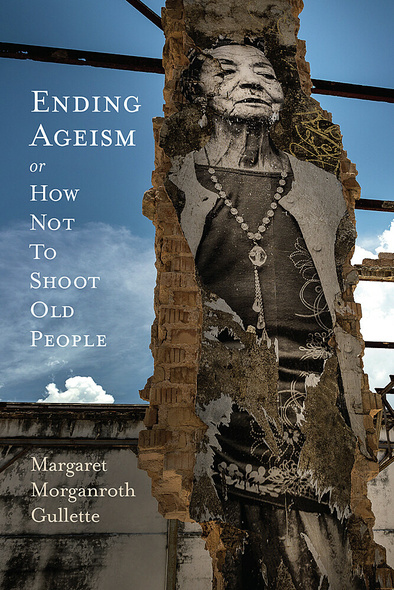
Ending Ageism, or How Not to Shoot Old People
When the term “ageism” was coined in 1969, many problems of exclusion seemed resolved by government programs like Social Security and Medicare. As people live longer lives, today’s great demotions of older people cut deeper into their self-worth and human relations, beyond the reach of law or public policy. In Ending Ageism, or How Not to Shoot Old People, award-winning writer and cultural critic Margaret Morganroth Gullette confronts the offenders: the ways people aging past midlife are portrayed in the media, by adult offspring; the esthetics and politics of representation in photography, film, and theater; and the incitement to commit suicide for those with early signs of “dementia.”
In this original and important book, Gullette presents evidence of pervasive age-related assaults in contemporary societies and their chronic affects. The sudden onset of age-related shaming can occur anywhere—the shove in the street, the cold shoulder at the party, the deaf ear at the meeting, the shut-out by the personnel office or the obtuseness of a government. Turning intimate suffering into public grievances, Ending Ageism, Or How Not to Shoot Old People effectively and beautifully argues that overcoming ageism is the next imperative social movement of our time.
About the cover image:
This elegant, dignified figure--Leda Machado, a Cuban old enough to have seen the Revolution--once the center of a vast photo mural, is now a fragment on a ruined wall. Ageism tears down the structures that all humans need to age well; to end it, a symbol of resilience offers us all brisk blue-sky energy.
“Leda Antonia Machado” from “Wrinkles of the City, 2012.”
Piotr Trybalski / Trybalski.com. Courtesy of the artist.
A Declaration of Grievances
"A Declaration of Grievances" was written by Margaret Morganroth Gullette and is excerpted from her book Ending Ageism, or How Not to Shoot Old People (2017, Rutgers University Press). The poster was designed by Carolyn Kerchof.
- A Declaration of Grievances (in English): https://d3tto5i5w9ogdd.cloudfront.net/wp-content/uploads/2023/01/15175130/A-Declaration-of-Grievances_Eng.pdf
- A Declaration of Grievances (in Spanish): https://d3tto5i5w9ogdd.cloudfront.net/wp-content/uploads/2023/01/15175131/A-Declaration-of-Grievances_Spanish.pdf
- A Declaration of Grievances (in French): https://d3tto5i5w9ogdd.cloudfront.net/wp-content/uploads/2023/01/15175130/A-Declaration-of-Grievances_French.pdf
- A Declaration of Grievances (in German): https://d3tto5i5w9ogdd.cloudfront.net/wp-content/uploads/2023/01/15175131/A-Declaration-of-Grievances_German.pdf
Print the PDF (make sure to click "fit to page") and hang the Declaration up in your home or place of work. Please share this link with other people you know who care about the rights of older persons. Share on social media with the hashtags #ADeclarationOfGrievances and #EndingAgeismGullette.
For more information, an excerpt, links to reviews, and special offers on this book, go to: https://www.rutgersuniversitypress.org/ending-ageism
Related website: (https://www.brandeis.edu/wsrc/scholars/profiles/gullette.html)
In her stirring new book, the pioneering US writer Margaret Morganroth Gullette argues that the meaning of the word burden has shifted from referring to the demanding work of care-giving (expressing empathy with the carer) on to the recipient of care. No wonder so many older people worry that they’ll become burdensome, and elder abuse is becoming so common.
As one of the world's leading authorities on ageing and ageism, any new book from Margaret Gullette is always exciting. Here she highlights the emotional wisdom and moral imagination of old age, so very different from the narrow, demeaning public rhetorics of ageing. An essential book for our times.'
Margaret Morganroth Gullette is one of the shining lights of age studies. For decades she has been sweeping her bright searchlight across the landscape of American social, political and popular culture to identify and analyze ageism wherever it lurks.
Margaret Morganroth Gullette's take-no-prisoners book is as scathing as its subtitle, which refers both to cameras (the power of portrayal) and to guns (the very real risks of growing old in an ageist world). Wide-ranging and erudite, Ending Ageism, or How Not to Shoot Old People frames the struggle for age equity in the most human and compelling of terms.'
In this bracing, wide-ranging new book by a pioneer of ageing studies, every page sparkles with fresh insight and burns with apt indignation at how the 'othering' of older people operates. Gullette exhorts us to reclaim public space and defiantly shows us how. Wonderful!'
For baby-boomers (like me) this is a sobering, but also an inspiring book. Ending Ageism, or How Not to Shoot Old People provides a fully developed cultural analysis, anatomizing the established habits of mind, institutional structures, and economic pressures that work to belittle and marginalize older people. The critique cuts deep, drawing together an extraordinary range of evidence from visual culture, media, social history, and literature. But Margaret Morganroth Gullette give us more than a jeremiad. Hers is a positive vision, offering many specific proposals for a movement of resistance that could encourage an epistemic shift – a new conception of life’s course, a fresh understanding of words like ‘age,’ ‘youth,’ ‘decline,’ and much more. This is a profoundly engaged, urgent work of the humanist imagination.’
Ending Ageism, or How Not to Shoot Old People penetrates far more deeply than the stock tropes about the affronts of age bias. With rich complexity Margaret Morganroth Gullette exposes ageism in many of its unusual manifestations, such as in her unusual and penetrating discussion of older farmers and world ecology. We too easily accept aging as a burden-in-waiting, rather than as the boon of longevity our added years can be both for individuals and global society.
Gullette’s many film references demonstrate her gravity as a film plus age critic and her opinion is worth seeking out
In her books, and perhaps most sharply in this new one, Ending Ageism, Gullette awakens her readers to the ideology of ageism
Margaret Morganroth Gullette wants you to know she means the title of her new book, Ending Ageism, or How Not to Shoot Old People, as a wake-up slap. She calls on Americans to be more aware of how the underlying age-based prejudice damages the lives of older people and their families—while often placing ethnic elders and older women in double jeopardy of discrimination, adding a touch of gray to sexism and racism they may already endure.
Ending Ageism, or How to Not Shoot Old People grapple[s] thoughtfully with how we [as a culture have forgotten how to value the elderly].
Award-winning writer and cultural critic Margaret Morganroth Gullette confronts age prejudice head on. She presents eye-opening and often frightening examples of ageism in every day society and confronts offenders and their bias.
Author sees book as a way to fight ageism,' by Cindy Cantrell
Ageism, And What We Can Do About It' interview with Margaret Morganroth Gullette on Wisconsin Public Radio
The One Who Feeds Us All: Old Farmers and Farm Fiction Amid the Global Food Crisis’ by Margaret Morganroth Gullette
Margaret Morganroth Gullette: The Anti-Ageism Revolutionist
[An] artfully composed work...Compelling...Recognizing ageism can help us transcend our netherworlds – be they a valley in northern California, a field in Shandong, or an urban farm in Havana – and ‘emerge to see the stars.
Unwanted at Midlife: Not Old, but 'Too Old,'’ by Margaret Morganroth Gullette
Gullette uses a personal, first-person voice and, in this way, masterfully weaves together personal experiences with cultural implications....[An] outstanding book.
The Monument and the Wrecking Crew: Ageism and the academy,' by Margaret Morganroth Gullette
How Does a Society Lose Respect for Experience and Age?' by Margaret Morganroth Gullette
When My Mother Wanted to Die: The Neglected Issues of Ageist Undertreatment,' by Margaret Morganroth Gullette
Ramping Up: The Problem That Went Deeper Than We Knew,' by Margaret Morganroth Gullette
Against ‘Aging’ – How to Talk about Growing Older,' by Margaret Morganroth Gullette
The ‘Christine Lagarde Memo,’ FOR YOUR EYES ONLY, from 'the Coalition,'' by Margaret Morganroth Gullette
Brave, defiant, and startling. . . Gullette's work is both insightful and inspiring, challenging and important; moreover, her writing style [is] at once scathing, funny, sharp, witty, and down-to-earth. .. . a text that works both in small chunks and as a larger argument. . . . much needed and urgent.
Ageist ‘Triage’ Is a Crime Against Humanity' by Margaret Morganroth Gullette
https://lareviewofbooks.org/short-takes/ageist-triage-covid-19
A compelling manifesto that can enable social workers and others to recognize and challenge pervasive individual and institutional ageism....As educators, social workers need to follow Morganroth Gullette’s recommendation to integrate critical analysis of age into courses, and this must include fieldwork education.
8 Redress
Notes 211
Bibliography 227
Index 253

